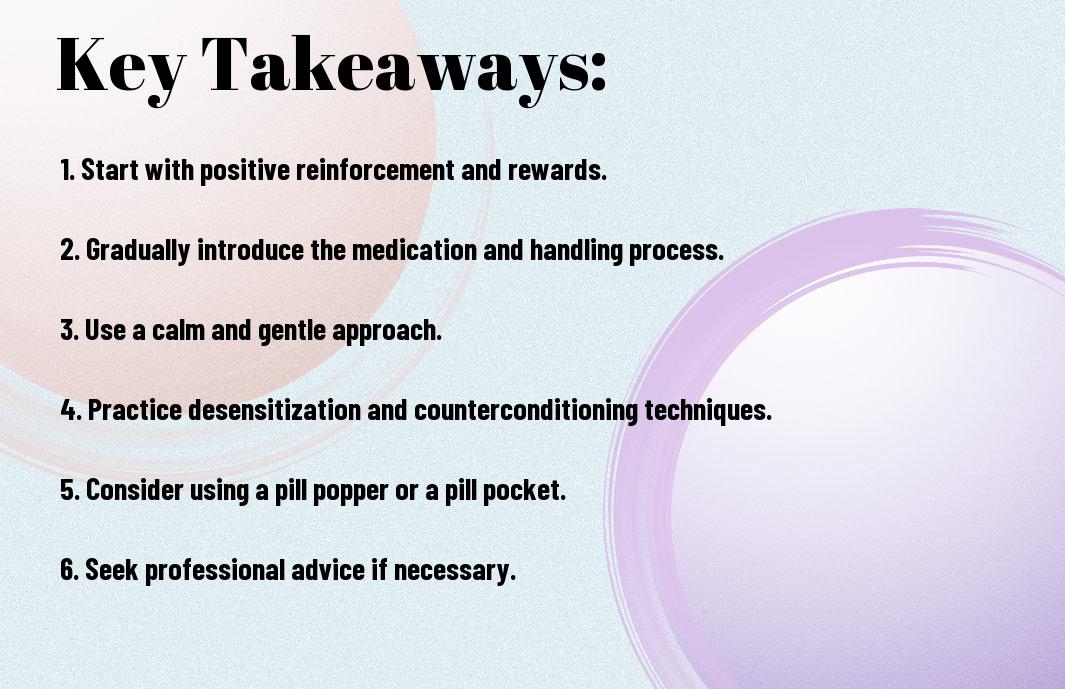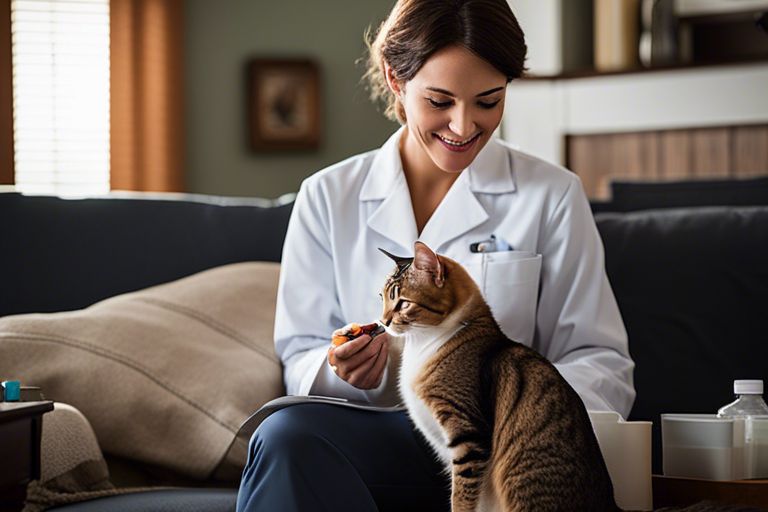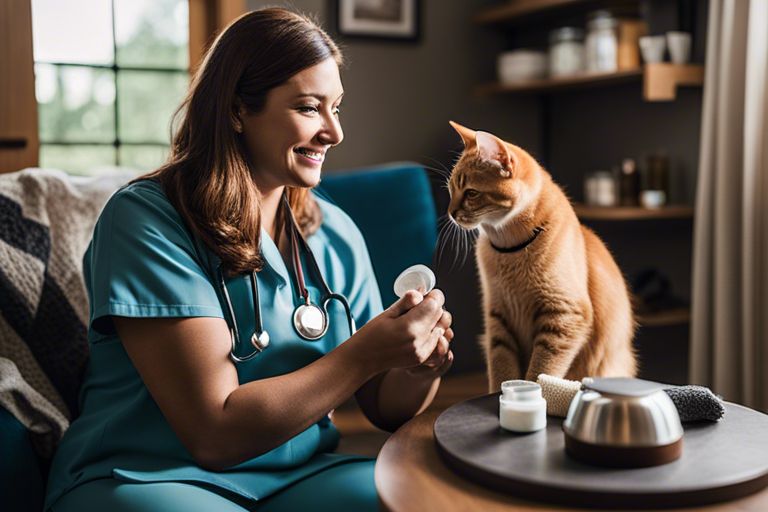Encouraging cooperation from your feline friend when it comes to medication can be a challenging task. However, there are several strategies that may help make the process more manageable. Whether you are dealing with oral medications, topical ointments, or even injections, establishing a routine and providing positive reinforcement can go a long way in getting your cat to be more cooperative during medication administration. In this blog post, we will discuss some helpful tips that can make this task a little easier for you and your feline companion.
Key Takeaways:
- Start with positive association: Introduce the medication in a positive context, such as mixing it with their favorite treat, to create a positive association with the medication.
- Use gentle restraint techniques: Gently restrain your cat while administering the medication to ensure safety and proper dosage.
- Be patient and calm: Approach the medication administration with calm and patience, as stress or anxiety can transfer to your cat.
- Offer praise and reward: Praise and reward your cat for cooperating during medication administration to reinforce positive behavior.
- Consult with a veterinarian: If you are struggling to administer medication, seek guidance from a veterinarian for alternative techniques or medications.

Preparing for Medication Administration
Obviously, before you can begin to teach your cat to be more cooperative during medication administration, you need to prepare adequately for the process. This involves understanding your cat’s behavior and creating a calm environment that will help make the process easier and less stressful for both you and your feline friend.
Understanding Feline Behavior
When it comes to medication administration, understanding your cat’s behavior is crucial. Cats are known for their independent nature, and they may become fearful or aggressive when they feel threatened or vulnerable. Understanding how your cat reacts to different situations and stimuli will guide you in handling them and administering the medication in the least stressful way possible.
Creating a Calm Environment
To teach your cat to be more cooperative during medication administration, you need to provide a calm and soothing environment. Keep the area where you administer the medication free from noise and other distractions that could agitate your cat. Additionally, you can use pheromone diffusers or calming sprays to help relax your cat. A quiet, dimly lit room can also help to create a sense of security for your cat to make the process easier for both of you.

Techniques for Administering Medication
Now that you understand the importance of cooperation during medication administration, let’s dive into some effective techniques to make the process easier for both you and your feline friend.
Oral Medication Tips
When administering oral medication to your cat, it’s essential to approach the process with patience and calmness. Here are some tips to make the experience more manageable for both you and your cat:
- Use a pill popper or pill pocket to make it easier to place the medication in your cat’s mouth.
- Be gentle but firm when holding your cat in place. It’s important to approach your cat with confidence to minimize stress.
- After giving the medication, offer a treat or reward to help create a positive association with the experience.
After successfully administering the oral medication, be sure to monitor your cat for any signs of adverse reactions and contact your veterinarian if you have any concerns.
Topical and Injectable Medication Strategies
When it comes to administering topical and injectable medications, it’s crucial to follow your veterinarian’s instructions carefully. Here are some strategies to effectively handle these types of medications:
- For topical medications, part your cat’s fur to expose the skin and apply the medication directly to the skin as directed.
- When administering injectable medications, be sure to handle the syringe carefully and administer the medication in the proper location as instructed by your veterinarian.
- After administering the medication, monitor your cat for any signs of discomfort or irritation at the application site.
It’s important to remember that each cat is unique, and what works for one may not work for another. Always consult with your veterinarian if you have any concerns about topical and injectable medications and their administration to your cat.

Positive Reinforcement and Training
After discussing with your veterinarian about the best approach for administering medication to your cat, you may find that positive reinforcement and training techniques can be highly effective. By using these methods, you can encourage your cat to be more cooperative and less resistant during medication administration.
Reward-Based Encouragement
One effective way to encourage cooperation from your cat is through reward-based encouragement. This involves offering your cat a treat or reward immediately after successfully administering the medication. By doing so, you create a positive association with the medication process, making your cat more likely to cooperate in the future. It’s important to consistently reward your cat every time they take their medication, reinforcing the behavior positively.
Desensitization and Conditioning Techniques
If your cat is particularly resistant or anxious about medication administration, desensitization and conditioning techniques can be helpful. This involves gradually exposing your cat to the medication process in a controlled and non-threatening manner. Start by introducing the medication to your cat without administering it, allowing them to sniff and investigate the medication at their own pace. Over time, gradually progress to the full administration process, all the while providing positive reinforcement and rewards to help condition your cat to be more comfortable with the experience.
Managing Long-Term Medication Routines
Lastly, for long-term medication routines, it’s important to establish a consistent schedule for administering the medication to your cat. This will help ensure that your cat receives the necessary medication at the right time each day. For more tips and tricks on medicating your cat, you can check out this helpful article on Happy Cat Month: Medicating Tips and Tricks.
Establishing a Consistent Schedule
When it comes to managing long-term medication routines for your cat, establishing a consistent schedule is crucial. Set specific times each day for administering the medication and stick to them as closely as possible. This will help ensure that your cat receives the medication consistently, which is important for maintaining their health. Remember, consistency is key when it comes to long-term medication routines for your feline friend.
When to Consult a Veterinary Professional
If you encounter any challenges or concerns while managing your cat’s long-term medication routine, it’s important to know when to consult a veterinary professional. If you notice any side effects or unexpected reactions to the medication, or if you’re having difficulty administering the medication, don’t hesitate to reach out to your vet for guidance. They can offer valuable advice and support to help you and your cat navigate the medication routine more effectively. Your vet’s expertise can make a significant difference in ensuring that your cat receives the necessary medication in a safe and stress-free manner.
Conclusion
From above tips, it is important to remember that patience and consistency are key when it comes to teaching your cat to be more cooperative during medication administration. By using positive reinforcement, creating a comfortable environment, and seeking professional advice when necessary, you can ensure a smoother and stress-free process for both you and your feline friend. Remember to always consider your cat’s individual personality and preferences, and adjust your approach accordingly. With time and dedication, you can successfully administer medication to your cat with minimal stress and fuss.
FAQ
Q: How can I make medication administration less stressful for my cat?
A: One way to make medication administration less stressful for your cat is to create a positive association with the process. Offer treats before and after giving medication to help your cat associate the experience with something enjoyable.
Q: What are some techniques for administering medication to an uncooperative cat?
A: If your cat is uncooperative, techniques such as wrapping your cat in a towel to restrict movement and using a pill popper can help make the process easier. It’s important to hold your cat securely but gently to avoid causing stress or discomfort.
Q: How can I train my cat to be more cooperative during medication administration?
A: You can train your cat to be more cooperative by gradually desensitizing them to the medication process. Start by introducing the medication in a non-threatening way, such as offering a taste on your finger. Gradually progress to using the actual medication while rewarding your cat for cooperation.

Jayley, a devoted cat enthusiast, also writer for other cat blog as well. She aims to dedicated to providing comprehensive information, insights, and advice on everything you’d ever want to know about our whiskered companions.
